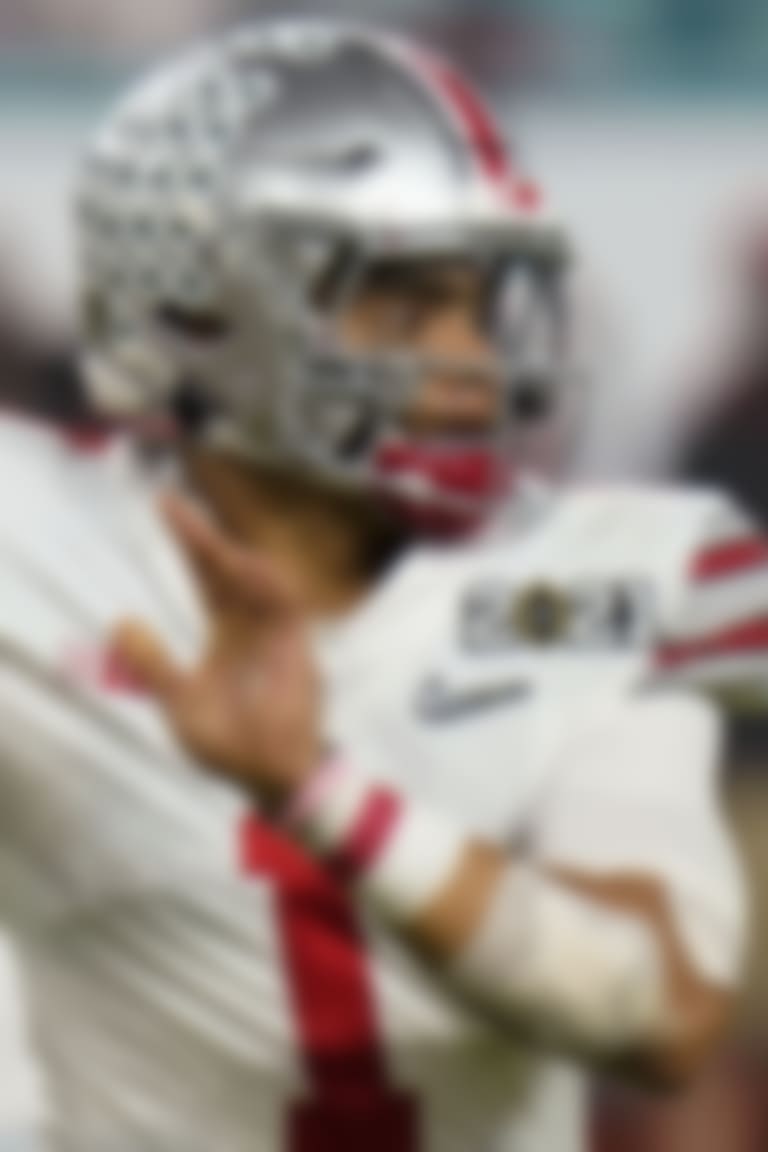A record number of African American quarterbacks started for their teams last season. And it all happened with little fanfare, which begs the question: Is race still a factor in the evaluation of NFL quarterbacks?
By Jim Trotter | Feb. 24, 2021
Doug Williams thinks back to that ground-breaking moment and smiles. No, it's not the one in Super Bowl XXII more than three decades ago, when Williams threw his way into both the record books and history books by becoming the first African American quarterback to start in football's most celebrated game, leading Washington to an unprecedented 35 second-quarter points in a dominating 42-10 win over Denver.
No, this moment came nearly nine years earlier, in Week 5 of the 1979 season, when, as quarterback of the Tampa Bay Buccaneers, he faced off against the Chicago Bears and quarterback Vince Evans. The game was not particularly noteworthy from a football standpoint -- the Bucs were 4-0, the Bears 2-2 -- but it was ground-breaking in the sense that it marked the first time an NFL game featured starting quarterbacks who both happened to be Black.
For a man who grew up in the segregated South and attended Grambling State University, one of 107 historically Black colleges and universities in the country, Williams found great significance in this game. You can hear it in his voice as he reflects on it, some 42 years later. His words are coated in reverence, his memory as crisp as that sunny afternoon at Soldier Field.
Such a meeting was unthinkable to him growing up in Zachary, Louisiana, in part because only 11 Black quarterbacks had ever attempted an NFL pass to that point. It was rare enough to see one quarterback of color in a game, let alone two.
"I thought it was a miracle," said Williams, who was selected with the 17th overall pick in the 1978 NFL Draft, the highest a Black quarterback had ever been taken at the time. "Vince and I, we didn't really talk about it with each other at the time because it was something where you don't have to talk about it. There was just this feeling between us. It was more or less that admiration after the game when you meet up and shake hands and hug each other, knowing the significance of what had just transpired in the National Football League."
Memories of that historic moment crept into Williams' mind during Week 2 of last season. He was studying the schedule for that weekend when he noticed four of the games featured head-to-head matchups of quarterbacks who happened to be Black. While noteworthy, the real significance to him was the accompanying silence. There were no headlines or hot takes. The racial component was neither top-of-mind nor an afterthought.
But it did beg a question: Does race still remain a factor in the evaluation of quarterbacks?
"As I’m sitting there broadcasting and we’re talking about Patrick Mahomes, Russell Wilson and Lamar Jackson, it’s not even, ‘Oh, my God. Look at what these guys are doing.’ It’s, ‘This is the new quarterback position.’ " TONY DUNGY
The question might sound ridiculous on the surface when considering three of the last six league MVPs were Black quarterbacks, including Patrick Mahomes and Lamar Jackson in back-to-back seasons; when the passing yards leader in each of the last two seasons was Black; when five of the last 15 quarterbacks drafted No. 1 overall were persons of color; and when any top-five list of individuals currently playing the position undoubtedly includes multiple Black people, often with Mahomes at the top of it.
But it was only three years ago that Bill Polian, a respected personnel executive and member of the Pro Football Hall of Fame, publicly suggested that Jackson switch positions coming out of college, a practice teams commonly used over the decades. Sport being a microcosm of society, discrimination was as real in football as it was in everyday life. Many decision-makers believed Blacks lacked the intelligence and leadership skills to run an offense, and in some cases owners simply did not want someone of color as the face of their franchise. The league even had an informal ban of Black players from 1934 to 1946, and it wasn't until 2001 that an African American was drafted No. 1 overall at quarterback, with Michael Vick going to the Atlanta Falcons.
That history makes the conversation more complicated when you peel back the layers. There is no denying progress has been made, and the numbers bear that out:
- In the 10 drafts from 2001 to 2010, six of the 27 quarterbacks selected in the first round (22.2 percent) were Black.
- Over the last 10 drafts, 11 of the 32 quarterbacks taken in the first round were Black (34.4 percent).
But there are mixed opinions about whether race is still a part of the equation.
"I do think we have reached that point," said Tony Dungy, a football analyst for NBC and retired coach who was inducted into the Pro Football Hall of Fame in 2016. "As I'm sitting there broadcasting and we're talking about Patrick Mahomes, Russell Wilson and Lamar Jackson, it's not even, 'Oh, my God. Look at what these guys are doing.' It's, 'This is the new quarterback position.' So I think we have gotten beyond that."
Dungy admits he wasn't always sure the league would reach this point. In 1976, he was the starting quarterback when the University of Minnesota traveled to Seattle to face a Washington team quarterbacked by Warren Moon. The game matched signal-callers who were both Black and both leading their respective conferences in passing. It was a monumental game in many ways, with the Huskies prevailing, 38-7.
From the opposite sideline, Dungy marveled at the poise, arm strength and leadership of Moon. This guy is great, he thought to himself. He would follow Moon from afar over the rest of the season and even the following season, as Moon led Washington, a two-touchdown underdog, past Michigan to earn Player of the Game honors in the Rose Bowl. There was no doubt in his mind Moon would be drafted that year, but it didn't happen, just as Dungy went undrafted the year before.
"When he didn't get drafted, that shook me," Dungy says. "You could see how good he was. That put some doubt in my mind (about whether things would ever change). They tell me with my skill set I need to be a defensive back, and Warren -- your skill set is maybe going to be better in Canada. That doesn't happen now. We have made significant progress there."
"There are people who are very uncomfortable with the fact that their quarterback is African American and making all this money and being endorsed the way they’re being endorsed.” WARREN MOON
Moon, who wound up playing in Canada before joining the NFL and becoming the first Black quarterback of the modern era to be inducted into the Pro Football Hall of Fame, agrees that the road is clearer. But barriers remain.
"We've reached a point with the masses where race isn't as big an issue, but there are people who are very uncomfortable with the fact that their quarterback is African American and making all this money and being endorsed the way they're being endorsed," he said. "There's always going to be that certain percentage of our population that feels that way because there's a large percentage of our population that's racist and they don't want to see African Americans in that position anyway. But for the most part people have accepted it. It's not something that's talked about as much in the media anymore. It's not talked about within teams anymore, I think, among general managers, coaches and owners. When you start the season off with 10 African Americans starting at quarterback on the first day of the season, and probably five of those 10 are the top quarterbacks in the league right now, that shows that we've made a ton of progress at that position."
Some of that progress can be heard in how the game used to be broadcast. In 1974, James Harris earned a trip to the Pro Bowl with the Rams, then returned the following season and guided Los Angeles to a 12-2 mark that tied Pittsburgh and Minnesota for best in the league. Still, you'd have thought his accomplishments were a fluke, based on an NFL Films highlight clip that included the following narration:
James Harris, No. 12, can do most of the things a quarterback is supposed to do. And he's done them well enough for the Los Angeles Rams to grab a spot in the playoffs. However, with the Rams' wealth of individual talent, and given their easy schedule, George Plimpton could have just as easily quarterbacked them to the division title. Harris is an accurate, long-distance thrower, but his play-calling is very predictable. Fortunately, the Rams have so many elusive receivers that Harris could announce his plays on the public-address system and they would still work.
The commentary was meant to be clever, if not cute, but ultimately, it was disrespectful, because it minimized Harris' mental acuity and physical ability. Today, it's unlikely such a script would be written, let alone approved, which could be construed as progress. Still, Harris is not prepared to say race has been completely erased from the process, because qualifiers continue to be used, as in "Black" quarterback instead of just quarterback.













